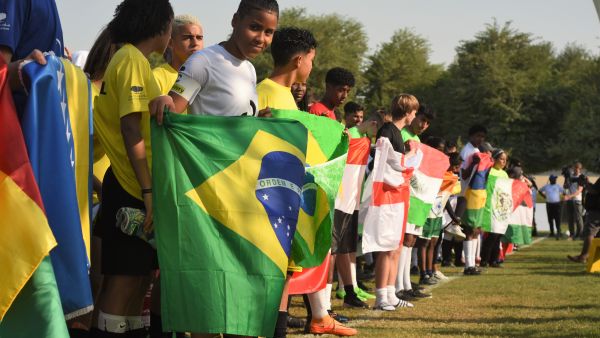QF-supported study to help street-connected children

The Street Child World Cup aims to give marginalized children a voice. But the work doesn’t end when the final whistle is blown. The event – which takes place every four years, ahead of the FIFA World Cup™ tournaments – strives to leave a long-lasting legacy that continues to impact young people all around the world.
Part of this year’s commitment to building a brighter future was the launch of a study commissioned by Street Child United and the Consortium for Street Children in collaboration with Qatar Foundation’s (QF) World Innovation Summit for Health (WISH). Announced at the biennial 2022 summit earlier this month, the study aims to address health concerns of children in street situations, their access to healthcare, and the barriers to accessing healthcare.
The study is being led by Dr. Shona Macleod, who – until recently – worked at the Consortium for Street Children as a Senior Research and Evaluation Officer, and now teaches International Development at King’s College London.
According to Dr. Macleod, a lot of data on the topic does already exist, but it is very specific to one city, rather than areas or countries. Through this research, she aims to gain views and opinions of people all over the world. To aid the study, she has so far done a literature review, sent out online surveys, and conducted interviews with adult team leaders.
Preliminary findings draw attention to the barriers making it difficult for children in street situations, including the cost of services, the requirement to show identity documents, discrimination from those working in the system, and the necessity of being accompanied by an adult to receive care.
She also attended the Street Child World Cup in Doha to interview participants. “The event in Qatar was a good opportunity to try and get a wide range of children's views from different countries,” she explained. “We focused on 19 of the teams, as not all of the teams included children in street situations – some included refugees or other vulnerable groups.”
With nearly 40 young people interviewed, Dr. Macleod said: “The young people have been very enthusiastic about talking to me, and sharing the challenges and issues they are facing. While the stories they tell are specific to their own circumstances and the situation in their country, we are seeing patterns emerging that point to shared experiences for children who have been in street situations.”
Once the findings have been collated, written up, and published, Dr. Macleod hopes that the study will help create recommendations that can be utilized around the world. “We’re trying to draw attention to the issues that these children face in healthcare, as well as build a peer reviewed evidence base that we can then use for advocacy activities that will encourage governments to take specific actions to ensure this group’s right to quality healthcare is respected.”
Another key legacy aspect of this year’s edition was the creation of the “Qatar Commitment” – a document which was signed on the final day of the event that reminds countries of their commitment to the United Nations Convention on the Rights of the Child, stating that all children are entitled to all rights, regardless of their circumstances. According to Dr. Macleod, the initial findings of the study also played a part in drafting this document, influencing the calls to action on the theme of quality healthcare.
The Street Child World Cup was held in partnership with QF. Featuring a World Cup-style football tournament, child-friendly congress sessions, and art workshops, the young people – 28 teams from 25 countries – came together to advocate for their rights, highlighting six key themes: identity, health, education, poverty, protection, and gender equality.
Background Information
Qatar Foundation
Qatar Foundation (QF) is a non-profit organization made up of more than 50 entities working in education, research, and community development.
Our unique ecosystem—supported by partnerships with leading international institutions—is built on initiatives that address our most pressing challenges, create global opportunities, and empower people to shape our present and future.







